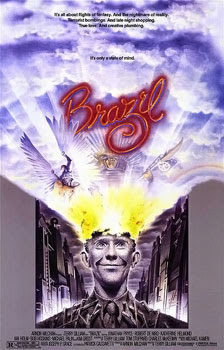Sometime in the late 1980s I started to watch Terry Gilliam's Brazil

It was either on VHS (the kids say "Huh?") or cable I don't remember which. I thought the trailer looked cool. For whatever reason, hormones, late-adolescent ennui, I soon lost interest (after 30 minutes maybe) and started making-out with my girlfriend, never to watch the progress of the dystopian North American story.
So, last night, after two decades--I watched the whole thing. It holds up very well, the story is interesting, the 40's style to the costume and the technology keeps it from dating itself. My only disappointment was it's Orwellian ending. Sure, it's dystopian, but I just wasn't prepared for the downer ending. I suppose my teenaged self would have thought it cool and authentic. My 39-year-old self wants some justice for the protagonist. There's too much injustice in the real world to find it where you least expect it in the celluloid world and be satisfied with it. A very good film, but don't expect puppies and sunshine.

It was either on VHS (the kids say "Huh?") or cable I don't remember which. I thought the trailer looked cool. For whatever reason, hormones, late-adolescent ennui, I soon lost interest (after 30 minutes maybe) and started making-out with my girlfriend, never to watch the progress of the dystopian North American story.
So, last night, after two decades--I watched the whole thing. It holds up very well, the story is interesting, the 40's style to the costume and the technology keeps it from dating itself. My only disappointment was it's Orwellian ending. Sure, it's dystopian, but I just wasn't prepared for the downer ending. I suppose my teenaged self would have thought it cool and authentic. My 39-year-old self wants some justice for the protagonist. There's too much injustice in the real world to find it where you least expect it in the celluloid world and be satisfied with it. A very good film, but don't expect puppies and sunshine.
Comments
SO enjoyed reconnecting yesterday.
jdd